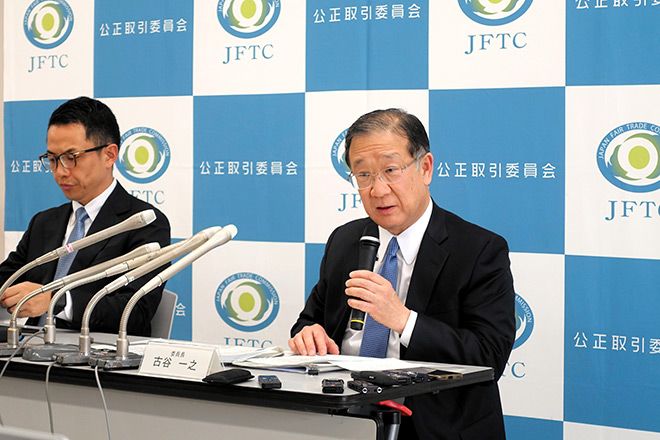
The government on April 26 approved legislation at a Cabinet meeting designed to loosen the stranglehold of tech giants Apple and Google and encourage competition in the smartphone app market.
The companies were deemed to have a monopoly as their respective operating systems, iOS and Android, are fitted in 99 percent of the smartphones in use in Japan, according to a study by the U.S. company StatCounter.
“It is important to expand the choices available to smartphone users,” Kazuyuki Furuya, chairman of the Fair Trade Commission, said at an April 26 news conference. Furuya will oversee implementation once the bill passes into law.
The legislation includes wording about prohibited acts related to the distribution of apps and payment systems. It will also basically triple the fine now in place under the Anti-Monopoly Law.
Once it becomes law, Japan will be on the same level as moves in Europe and the United States to regulate giant tech companies.
The legislation defines four designated software to be covered by the law–operating systems, app stores, browsers and search engines.
Companies with enormous influence in each software field will be specified as being subject to coverage under the law.
Through their operating systems and app stores, Apple and Google are in position to determine the rules for developing and distributing apps as well as decide how payments are made for use of the apps.
App developing companies pay up to 30 percent of their app sales in commissions to Apple and Google.
The commissions are said to be one reason app use fees continue to remain high for users.
The legislation bans the specified company from doing anything to hinder new app stores from setting up shop as well as prohibiting use of payments systems other than the ones used by the two companies.
Companies will also be banned from placing priority in search results on services provided by the company.
One aim of the legislation is to encourage the appearance of new app stores that are focused on specific themes, such as games or apps for children.
The rationale for this is that if different app stores compete in the selling of apps, the user fee will decrease. And if greater competition is introduced into the app market, that might encourage innovation and the development of other apps.
The new law would complement the Anti-Monopoly Law. It also aims to shorten the time it takes to look into violations.
Because the FTC now investigates suspected violations of the Anti-Monopoly Law after the fact, it often takes years before violations can be designated and fines imposed.
The speed at which trends occur in the digital field means the FTC simply cannot keep up with all the new violations.
The introduction of “ex-ante regulations” that define prohibited acts beforehand is designed to speed up the process of cracking down on violations.
Any violations of the new law would impose a fine of 20 percent of domestic sales related to the offense in question.
Under the Anti-Monopoly Law, the fine is set at 6 percent of sales.
If the legislation passes the current Diet session, it could be enacted fully from December 2025.
The European Union began implementing its Digital Markets Act from March. The same month, the U.S. Justice Department filed a lawsuit against Apple Inc. on grounds it had violated antitrust laws.
In a statement April 26, Google LLC called for more constructive discussions with the government and the industry.
While Apple did not issue a statement, it has made clear it strongly opposes any provisions that would allow other app stores on its iOS.
Apple prides itself on implementing strict security evaluations before allowing any app to appear on its App Store on iPhones. Company officials and iPhone users have expressed concerns about security and privacy if such new app stores are allowed.
As a compromise measure, Apple and Google may be allowed to evaluate security for app stores considering entry into their operating systems.
(This article was written by Naoko Murai and Shinya Wake.)




















